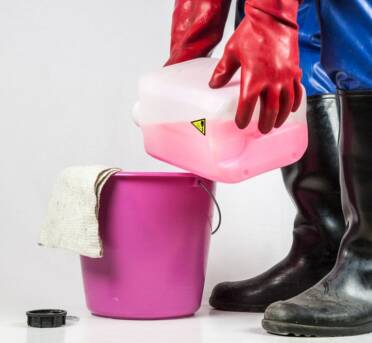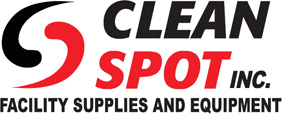
Industrial Cleaning Chemicals: Safe Handling and Effective Use for Results
Industrial cleaning chemicals are the serious stuff! They cut through grease, grime, soot, stains, and just about anything else you don’t want to touch, but they can also be dangerous when mishandled.
Whether you’re cleaning up after a fire, working in manufacturing, or restoring a space to “good as new,” knowing how to handle these chemicals properly keeps your team safe, your space clean, and your job stress-free.
At Clean Spot, we specialize in providing the industrial cleaning chemicals and equipment professionals rely on to get the job done properly and safely. Choosing the right product (and using it properly) doesn’t just protect your crew, it actually makes your work easier, faster, and more effective. Here are some essential safety tips and best practices to help you make the most of your cleaning supplies while keeping hazards at bay.
1. Make Safety Data Sheets (SDS) readily available
All professional industrial cleaning chemicals come with a Safety Data Sheet (SDS) that specifies hazards, ingredients, first aid measures, fire measures, handling and storage, exposure control, physical and chemical properties, disposal information, and more. You can ask your cleaning supplier for the SDS of the specific chemical product.
We recommend keeping an organized binder of the SDS for each cleaning chemical and keeping it in the room where you store the chemicals. We also recommend placing the SDS on the wall where the product is stored for easy and quick reference. During a spill or an emergency, this will become handy when an employee needs to access the SDS for information.
For every new employee, be sure to include SDS in your training. Explain their importance and where the sheets are located.
2. Have the proper personal protection equipment (PPE)
Some chemicals require masks and specific gloves for safe handling. It’s important to follow the PPE specifications of each product to prevent chemical burns and minimize or eliminate the risk of exposure. Keep personal protection equipment well-stocked, as certain chemicals should not be used without the proper equipment.
3. Ensure proper ventilation
Proper ventilation is critical when handling commercial and industrial cleaning chemicals. Again, cleaning staff should be using masks if required. Turn on bathroom and kitchen fans when cleaning and, during deeper cleaning with specific chemicals, open windows and use portable fans to ventilate the air.
4. Label containers properly
Have specific containers for each chemical, and never mix products. Be sure the bulk product container matches the spray bottle or small container you’re refilling. Relabel containers if the original labels are gone and ensure hazards or warnings are visible. If the label is missing, do not use the chemical and call your cleaning supplier for proper disposal.
5. Create strict rules for storing chemicals
Guidelines for storing cleaning products should be included in new employee training, checked regularly for compliance, and included in refresher training during employee assessments.
These rules can include (and are not limited to):
- Never place cleaning chemicals near a heat source.
- Never mix cleaning chemicals or put them in different containers.
- Never use cleaning chemicals that are not labelled.
- Avoid storing flammable chemicals in hot rooms or rooms that are not ventilated.
- Only authorized staff can access the cleaning storage room.
- Have a spray bottle of a multipurpose product ready at the reception desk for general spills.
- If you’re unsure what cleaning product to use, always ask the cleaning staff or management for further instructions.
Storing industrial cleaning chemicals properly isn’t just about staying organized — it’s about keeping your team safe. When these products aren’t handled or stored the right way, they can cause skin or eye irritation, breathing issues, or even more serious health concerns. That’s why it’s so important to make sure only trained staff are using industrial cleaning chemicals. A little prep and the right know-how go a long way in preventing accidents and keeping the job running smoothly.
Our Recommended Products: Bioesque Solutions
At CleanSpot, we often recommend Bioesque Solutions for restoration cleaning supplies. Their products are powered by Thymox® Technology—a sustainable, plant-based formula known for its strong antimicrobial properties. It’s biodegradable, non-toxic, non-corrosive, and safe for both workers and the environment.
Whether you’re dealing with tough odours, mould, or general cleanup, Bioesque offers powerful products that deliver results without the harsh chemicals. These products make tough cleaning jobs easier, safer, and a little more eco-friendly—exactly how we like it.
Clean Like a Pro, Not a Mad Scientist!
Industrial cleaning chemicals are powerful tools—but only when used safely and correctly. That’s why regular training on proper handling, dilution, spill response, and label reading is a must. With the right products, PPE, and safety know-how, your cleaning operation runs smoother and your team stays protected. We also make stocking up on trusted cleaning supplies easier with Free Shipping on orders over $150.
At Clean Spot, we carry the tough, high-performance cleaning supplies you need with the expert support to help you use them right!
Latest Posts
- Happy Holidays From Clean Spot
- The Hidden Risks of Mixing Cleaning Chemicals
- How to Prevent Winter Slipping and Sliding at the Office
- Supplying Your Snow and Ice Management Business
- How to Choose the Right Ice Melter for Your Property: Liquid vs. Granular
- Why Bulk Ice Melter Purchases Are Key for Snow and Ice Management Businesses
- Stopping Germs, Saving Dollars: Essential Cleaning Supplies for Community Centres
- Your Guide to Workplace Hygiene: Preventing Germs and Improving Public Restroom Care
- Must-Have Janitorial Supplies for Large-Scale Construction Projects
- Window Cleaning Equipment That Makes the Workplace Look Brand New
- How Trends and Technologies in the Cleaning Industry Are Transforming the Way We Clean
- Vacuum Parts Buying Guide: What to Check Before Buying from a Supplier
- A Guide to Keeping Your Business Clean and Festive for Canada Day
- Industrial Cleaning Chemicals: Safe Handling and Effective Use for Results
- The Ultimate Guide for Window Cleaning Supplies for Commercial Use
Browse All Categories
- Bins
- Building Maintenance
- Carts & Trucks
- Cleaning Chemicals
- Cleaning Equipment
- Cleaning Equipment - Parts
- Cleaning Tools & Accessories
- Clearance
- Dust Mopping Supplies
- Floor Pads & Screens
- Garbage Bags
- Hand Dryers
- Hospitality Products
- Ice Melter
- Mats
- MicroFibre Cleaning
- Miscellaneous
- Paper And Packaging
- Pure Water Power Window Cleaning
- Vacuum Bags & Common Parts
- Wet Mopping Supplies
- Window Cleaning



